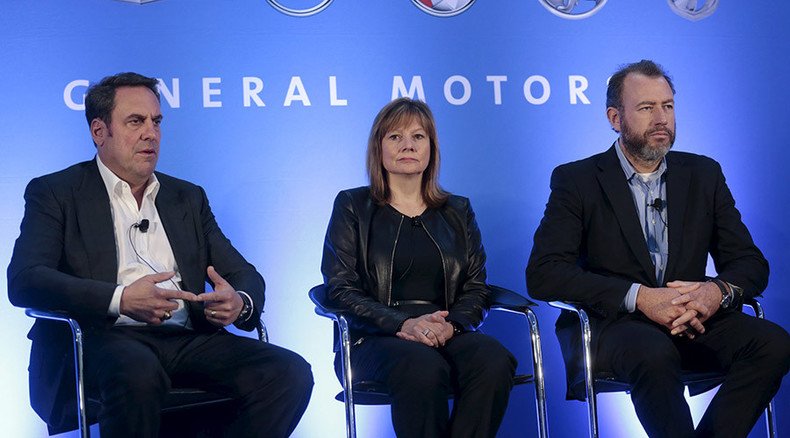Lawmakers seek to punish executives who hide deadly defects

Two Democratic lawmakers think that corporate executives who conceal deadly defects in their companies’ products should be jailed. They have introduced the Hide No Harm Act in the wake of a General Motors scandal that killed over 120 people.
Senators Richard Blumenthal (D-Connecticut) and Bob Casey (D-Pennsylvania) introduced the bill on Tuesday. If passed, it would make failing to inform federal regulators about faulty and dangerous products a crime punishable by five years in prison. It would also safeguard whistleblowers who reveal that information from criminal liability.
The bill is a reaction to a “deferred prosecution agreement” reached between GM and the Department of Justice in September that found no officers criminally liable for knowingly concealing information about a lethal safety defect in the car manufacturer’s ignition switches. The auto maker eventually recalled about 2 million cars. The faulty part, which caused cars to shut off abruptly or disable airbags, caused 124 deaths –10 times more than GM originally believed – and 275 injuries, 17 of them serious.
GM refuses 91% of faulty ignition switch claims http://t.co/Cg87CMTaVopic.twitter.com/Y7NfF2ihzF
— RT America (@RT_America) August 25, 2015The settlement calls for GM to pay the government $900 million for its handling of the defective ignition switch. The automaker separately agreed to offer settlements to the families of the deceased victims.
The DOJ prosecutor in the case, US Attorney Preet Bharara, admitted that “there are gaps in the law” that prevented him from going after GM executives.
“We’re not done, and it remains possible that we will charge an individual, but the law doesn’t always let us to do what we wish we could,” Bharara told Reuters.
The Hide No Harm Act would untie federal prosecutors’ hands, subjecting corporate executives to an additional level of accountability, Casey said in a statement. The measures contained in the bill are “common-sense, long-overdue reforms to ensure officers are held responsible for dishonorable acts that put lives at risk,” Blumenthal said.
“We cannot continue to condone blatantly deceptive and immoral behavior – for too long, individuals who deceive the public and cover up information about dangerous or deadly products have gotten away with little to no penalties,” the Connecticut senator said, noting that no one had been held accountable at either GM or Takata, Japan’s largest airbag manufacturer, which recalled nearly 34 million cars in the US in May because of a dangerous defect that could cause explosions of unpredictable force. The faulty airbags killed six people and injured over 100 others worldwide.
“We owe it to the victims and their families of the preventable tragedies to ensure that justice will be served for anyone complicit in future cover-ups,” Blumenthal continued.
Explosive risk: Takata recalls almost 34 mn cars in US due to faulty airbags http://t.co/66sqIlu8E5pic.twitter.com/PUrZkQaAkR
— RT America (@RT_America) May 21, 2015Supporters of the bill pointed not only to the GM and Takata recalls, but also to the recent Volkswagen scandal in which the German auto maker was caught installing software allowing nearly half a million diesel vehicles to cheat on Environmental Protection Agency emissions inspections.
“The GM and Volkswagen scandals make it brutally clear Congress must do more to help consumers whose safety and trust have been violated. We need bold measures to raise the bar for safer cars, and make sure when automakers break the law and cover up the truth, the penalties fit the crime,” William Wallace, a policy analyst for Consumers Union, said in a recent statement before testifying on Capitol Hill about the need for accountability in auto safety laws.
Wallace testified that two other bills, the Improving Recall Tracking Act and the Motor Vehicle Safety Whistleblower Act, wouldn’t “go nearly far enough in making sure dangerous defects are fixed before someone is hurt or killed.”
GM saved only a dollar per car by avoiding defective switch redesign http://t.co/XzyDjaJZ7N
— RT America (@RT_America) April 2, 2014
Consumers Union, the advocacy arm of Consumer Reports, is also supporting the Hide No Harm Act, with Ellen Bloom, the group’s senior director of federal policy, calling the bill “the right prescription for an outrageous problem.”
Blumenthal and Casey, along with then-Senator Tom Harkin (D-Iowa), originally introduced the legislation in 2014. In addition to GM’s “willful concealment of harm,” they also cited actions by Second Chance Body Armor and Simplicity for Children.












